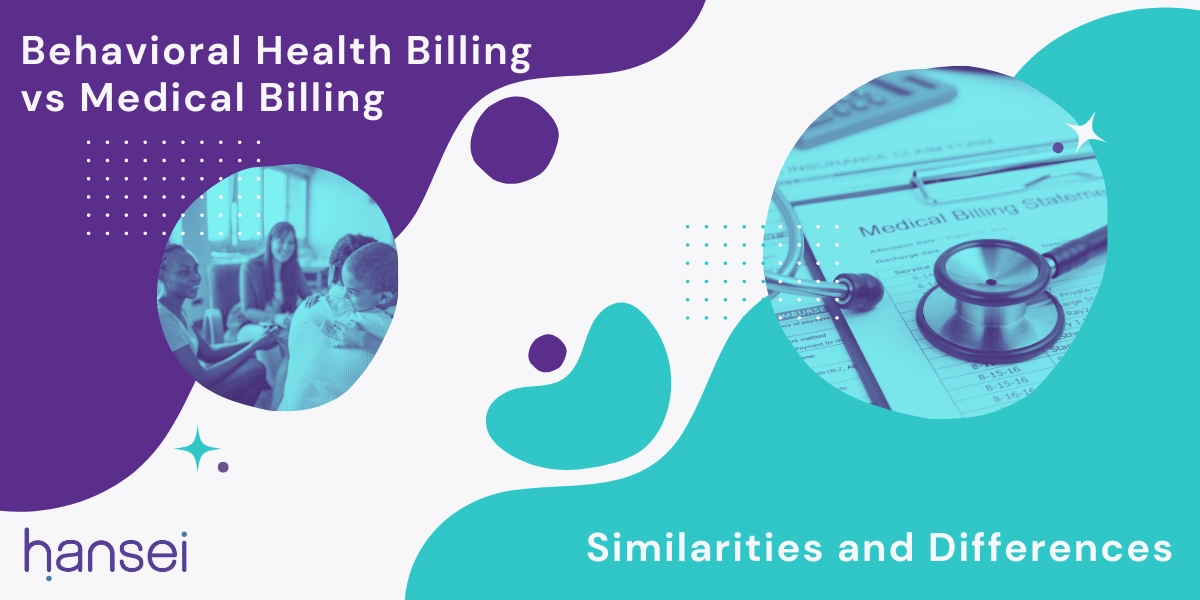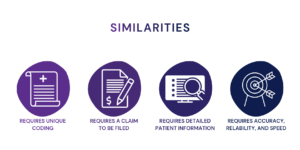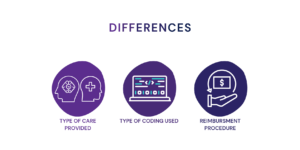Blog

Table of Contents
Medical billing and behavioral health billing are two important and interconnected components of the healthcare sector. Each form of billing requires submitting requests to insurance providers and other payers for payment for the services given to patients. There are a few common elements between the two types of billing, such as coding systems and precise documentation, however, there are also major differences, such as the services included and the particular laws that regulate each kind of billing. Knowing the similarities and differences between medical billing and behavioral health billing is essential for healthcare providers and billing personnel to make sure that claims are processed properly and on time.
Continue reading to learn more about both types of billing, how they are similar, their key differences, and which billing service is right for you.
Medical billing and behavioral health billing are similar in that they both involve submitting claims to insurance companies for payment, but they differ in the type of services and codes used to describe the services rendered.
What is Behavioral Health Billing?
The process of billing for mental health and substance abuse services is known as behavioral health billing. This requires specific codes which are used to portray the type of diagnosis, treatment and intensity of care given. These codes come from the Diagnostic and Statistical Manual of Mental Disorders (DSM) and the Current Procedural Terminology (CPT) and must be submitted to the insurance provider together with the patient’s details, such as demographic information and insurance policy data.
Filing claims for behavioral health services can be complicated because of the social stigma that is attached to mental health and substance abuse, as well as difficulties in collecting precise diagnostic data. Despite this, it is essential for healthcare providers to accurately bill for these types of services to receive proper payment for their services and to guarantee their patients can acquire the care they require.
What is Medical Billing?
Medical billing is the practice of sending claims to insurance companies for payment of medical treatments given to patients. This method requires the utilization of certain codes to specify the services provided, for example, diagnosis codes, procedure codes, and modifier codes, which are used to explain the kind and intensity of care given. These codes come from the International Classification of Diseases (ICD) and the Current Procedural Terminology (CPT) codes, and they are included in the submission to the insurance provider along with details about the patient, such as demographic information and insurance policy data.
The medical billing process is intricate in nature and necessitates exact coding, punctual submission of claims, and efficient communication with insurance firms to settle any discrepancies or disagreements. It is a fundamental component of healthcare delivery since it helps make certain that healthcare professionals obtain equitable remuneration for their work and that patients are able to acquire the care they need. Furthermore, it assists healthcare providers to keep track of their finances and utilize their assets more proficiently.
Similarities Between Behavioral Health and Medical Billing
Both behavioral health and medical billing require the filing of claims with insurance firms to cover the costs of the medical care given to patients. For each type of billing, unique coding is used to explain the treatments received, such as diagnostic codes, procedure codes, and modifier codes. These codes, which come from classifying systems like the DSM for behavior health and the ICD for medical billing, are used to display the kind and intensity of services provided.

For either kind of billing procedure, it is essential to provide pertinent patient details, for instance, demographic information and insurance policy information in order to process the charges precisely.
In addition, both mental health and medical billing can be intricate and necessitate accurate coding, timely submission of claims, and reliable communication with insurance companies to get reasonable compensation for provided services and make sure that patients get the care they require. Thus, it can be concluded that mental health and medical billing have a few essential commonalities in terms of the procedures and data needed for claim submission and compensation.
Differences in Behavioral Health and Medical Billing
There are various distinctions between behavioral health and medical billing. Primarily, the sort of care and services provided are dissimilar between the two. Behavioral health billing requires the submission of claims for mental health and addiction services, while medical billing includes claims for a variety of medical and surgical treatments. Furthermore, the coding systems used to portray the services offered also contrast between the two. Behavioral health billing makes use of codes from the DSM, which is predominantly centered on the categorization of mental illnesses, while medical billing employs codes from the ICD, which is a more extensive classification system that features codes for a wider selection of physical and mental ailments.

Furthermore, the process of reimbursement for both mental health and medical billing may be dissimilar. Insurance companies may have different regulations and reimbursement levels for mental health services compared to other medical services, and this can affect the number and kind of services that healthcare providers can provide. Aside from that, the stigma connected with mental health and substance abuse can complicate the acquisition of precise diagnostic information and the accurate billing of these services, and this can lead to conflicts and holdups with reimbursement.
All in all, although there are a few commonalities between behavioral health and medical billing, and there are still numerous distinctions, such as the type of treatment and services, the classification systems employed, and the reimbursement procedure. These discrepancies demonstrate the need for specialized knowledge in both areas to ensure that claims are submitted correctly and that healthcare providers receive a fair payment for their offerings.
Which One is Right For Your Business?
The choice between mental health billing and medical billing for your business or practice depends on the type of services you provide and your target patient population. If your business or practice primarily provides mental health and substance abuse services, then it would make sense to focus on behavioral health billing. On the other hand, if your business or practice provides a wider range of healthcare services, including medical and surgical procedures, then medical billing would be the more appropriate option.
It is important to consider the specific reimbursement policies of insurance companies for each type of service when making your decision. Mental health and substance abuse services may have different coverage policies and reimbursement rates compared to other types of medical services, and it is important to be aware of these differences to ensure that you receive fair reimbursement for your services. Additionally, it is important to consider the specific coding and documentation requirements for each type of billing and to have a thorough understanding of the relevant classification systems and codes used.
In summary, the choice between mental health billing and medical billing for your business or practice depends on the type of services you provide, the reimbursement policies of insurance companies, and your understanding of the relevant coding and documentation requirements. It may be helpful to consult with a billing specialist or expert in both areas to help determine the best option for your business or practice.
Trust Hansei Solutions With Your Billing Needs
Behavioral health and medical billing can be complex and time-consuming, but they are an essential aspect of healthcare delivery and essential for the financial stability of your business or practice. If you’re struggling with billing or seeking to improve the accuracy and efficiency of your billing process, Hansei Solutions can help.
As a leading behavioral health and medical billing company, Hansei Solutions offers comprehensive billing services designed to meet the unique needs of healthcare providers. Their team of experts has extensive knowledge and experience in coding, claims submission, and insurance reimbursement, and they work closely with healthcare providers to ensure that their billing process is accurate, efficient, and in compliance with all relevant regulations.
If you’re ready to take your medical billing to the next level and ensure that your business or practice is financially stable, contact Hansei Solutions today!

Ready to focus on providing healthcare? Let us lighten your load.
We’re here to address your pain points and create growth opportunities for your organization. We’re passionate about what we do, and it shows in every interaction. Learn what makes us tick and schedule a demo today.